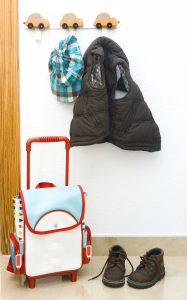For the most part, your day has very little spare time in it. But when we begin to add your job and parenting and now housework or cleaning, food shopping, and ‘distance’ teaching your kids their academic lessons, it can be overwhelming and make the most organized, put-together person lose their minds! So in this time of craziness, when so much more is being put on your shoulders, here are a few tips that may help keep you a little saner. And who knows you may create a habit in the house that sticks!

#1 Know Your Priorities •
First and foremost, you need to figure out what is most important to you for the day to be complete? How about the week or the month or overall in life? What is YOUR main priority, and what can take the back seat? Only you can determine what is vital for you and your family in this life, not the latest social media influencer. Determine what you value most in life to filter obligations through your lens of what is important to you and your family. Now that does not mean you have to pick one area over another. Instead, it means to have a list of the must-do things that need to be accomplished or achieved so that you can all have a satisfying and productive time together.
#2 Let Go of Perfect Expectations •
Let. It. Go! This may be the hardest thing for you to do if you are a Type A perfectionist like me, but it is key! Here’s the revelation that I had to come to terms with, you don’t have to run your household the way your parents did theirs! It is OK to soften your standards and set realistic goals for both your children and yourself. One person, YOU, don’t have to do everything and really can’t with all the craziness that is currently going on in the world. It is too hard for us to be the parent, the homemaker, the cook, the maid, the teacher, the nurse, oh, and don’t forget your actual job! It’s far more important to have quality time for yourself and your family. Too many of us have this unneeded pressure that we have put on ourselves and our children to live up to. There is no gold standard! Now don’t get me wrong, it’ is good to have standards, but when it comes to your mental health and sanity, you need to let ‘perfect’ go. We need to step back and look at the bigger picture in that just getting the job done is good enough.

Most of the time, when it comes down to it, you are the only person that will notice the difference anyway! Show to your kids that it is more important the effort and willingness to try and do something and complete it instead of the need to have it be perfect.
#3 Routines are a Must At Home Too •
Not only are routines comforting for children, but they also help to make life easier for any adult! Have regular times throughout the day and week for specific chores, homework/schoolwork, relaxing time and meals, or snacks. Explaining the schedule to your children will help them to understand what is being expected of them throughout their day. Schedules will help them gain confidence from knowing that they have an essential role and a specific one in the family. The key is that this time is being set aside specifically for the task to be completed. However, if they can complete it, sufficiently of course, before the allotted time, they can pick from some approved free time tasks. For example, if they are told that they have from 9-10 to clean their room and make their bed, and they are done by 9:40 they can either stay in their room and play or read a book until the allotted time is up. This allows others that have that time set aside for tasks to complete theirs too! Having a daily schedule that is consistent and expected will help your household run smoother and with more efficiency. Just remember that when you create household routines, try to stick with them for at least 3 to 4 weeks to develop some of them as habits.
#4 Keep an ‘Organized’ Home •
So, my perfectionists out there may need to take a breath, but your home does not need to always be perfectly well kept. I know it can be a hard thing to hear and follow through on, but nobody has time for that today. However, having organized household life runs so much more smoothly just by having things somewhat organized. But if you are spending more than 10 minutes a day looking for something, then you are not organizing things enough.

Both you and your household need to have systems in place to help everyone keep track of their “stuff.” We want to be able to grab the things that we need quickly and easily on the way out the door or to know exactly where to go when we are looking for something – creating a plan for where things can be placed when they are not being used for each person in the home. This may mean having baskets for the kid’s shoes and bags, specific bins for toys, and even a place for car keys, sunglasses, and now masks and gloves. This also means that the rest of your home will start to become relatively organized, too, with less clutter all around. Taking organization up one more step would be to have specific areas in the house for schoolwork/homework, your business work, and playtime or relaxation time, too so that there can be at least one other area to keep your head straight when trying to type an email besides the bathroom!
#5 Stop Multi-Tasking •
So many people feel that they are beyond exceptional at this funny thing called multitasking. But the truth of the matter is, our brains DO NOT multitask at all, they task switch! This means that the brain is never entirely focused on either activity or project 100% of the time and only puts out sufficient or satisfactory work either. It also means that both tasks will take longer and will not be as complete or polished as you hoped they would be. So, pick one thing and then do it fully and completely. Doing so will help you be done faster with all your tasks and with better results overall.
#6 Keep To-Do Lists and Just ONE Calendar •
Keeping a running to-do list is key to making sure that you can get all the little things done throughout the course of our days. Life is made up of full of a flurry of daily activities, and as we mentioned before, we can only concentrate on the one thing that we are doing in front of us. By making a list off to the side, you can quickly shift focus to writing down the activity to remember to do it later so it won’t be forgotten. A quick second step to this process is that if it is a task that will require a chunk of your time (even an hour or two), then try and schedule it for when you know that it can get that done.

Many people use their phones to keep track of their schedules. I also use a monthly hard copy calendar. This way, I can visually see my entire month at a glance.
One other thing that can help is using a single calendar for everyone’s activities, and then keeping it in a convenient place will help everyone see what’s happening for the day and upcoming week. You can even use different colored markers for each person’s appointments, lessons, and activities. Try and make it a point to review the schedule at a family meal or meeting before the week begins to be able to look ahead for conflicts and appointments and tasks that may need to be planned around for the upcoming week. Be realistic about the time commitments of all the activities and events as well. This sensible approach will give you a sense of control over the week, and everyone will get off to a smoother start.
# 7 Delegate – Don’t Do Too Much for Your Kids •
It is true. As much as we all hate to admit it, one of the biggest obstacles that create more wasted time in the household can be you. The parent, trying to do it all. It is true. As much as you may think it is not so helpful to do, you need to delegate tasks in the home. Children from a very young age can be assigned chores and tasks that they can do in the house on a daily basis. Take some alone time to discuss with your partner how you’ll share the adult responsibilities and what small tasks and chores the kids can each take on themselves. Remember, it does not have to be completed “perfectly,” as we mentioned above, as long as the effort is there. Then have a family meeting and make it clear what duties are expected from each member of the household and if needed the rewards at the end of the day or week for completing them.
#8 Assign Time Limits & Work as Though It is Urgent •
A primary way that I have adopted to get things done at work and home is to light a fire underneath me! I don’t complete tasks slowly, but as if it is the last day before I am leaving for vacation (by myself) once I do it! Once I set out to complete a task, I work on it as if it needed to be done yesterday for an important client. I try and set a time limit for myself but then calculatingly stick to it. If I block out an hour’s time frame to complete a task, it can be done if I stay on the task that I am doing and work quickly during the time I set aside for it. I know that if I take breaks or deviate from the task at hand, it won’t get done in the time that I set aside for it. Setting the time limit and my expectation of what I plan to complete in detail during the time frame I set aside helps to get me slightly more motivated to move through the task with urgency but also so that the task can get done efficiently.
#9 Be Honest About Wasted Time •

So this is the area where I feel as if we can all fall into the rabbit hole as Alice did in Wonderland. There are so many times in the course of your day that there are moments that you can find and make slightly more productive. For instance, if you have a doctor’s appointment and are sitting in the waiting room for your appointment, are you using that time to be productive? What if you brought along your schedule for home or work to see what the next few days entail and to try and schedule other appointments? This would help give you the best of both worlds, an appointment that had to be kept and time being put to good use! Learn to take advantage of the waiting time you have throughout the day. There are so many ways that parents today get sucked into the time warp of wasted time. Let’s be honest; how much time do you spend scrolling social media each day? We all do it. What about the amount of time you are online shopping, scrolling the Instagram feeds, or on any social media platform? We are told and may even follow through with placing limits on our kids with technology, so why wouldn’t we try and do the same for ourselves? This would help us to optimize our time more during the day, wouldn’t it? Don’t get me wrong; social networks like Facebook can be a big help to working parents. If you need to find a piano teacher or an excellent cleaning service, there are many places to go, but there is a social media black hole you can find yourself in too. How many times have you looked up from your phone after responding to trivial messages to find that hours, not just a few minutes have gone by? Set limits on how much time you spend on your favorite networks or what time you go onto them during the day. For example, 20 minutes a day on weekdays or twice daily visits on weekends, first thing in the morning or only after the laundry is done. You can be in control of it all if you set a time limit and know your priorities!
As specialists trained in working with children, parents, and the family, we can help to assess and combat the behaviors and habits that you are seeing with you, your child, and the family system that are creating tension and unrest for you all. We are here to help you overcome and work through the pitfall and traps that all parents can fall into.
Sign up for your Free Consultation today!
Join our Facebook Group, and like/follow our Facebook Page or Instagram for more articles and tips!
Melissa Bianchini is a licensed clinical social worker in New York and the owner and executive director at Sensory Stepping Stones, LLC. Her career has spanned over 20 years working with children and families around neurological processing concerns, stress-related trauma, and anxiety. Her passion in life is to make a difference in the lives of kids and families that she works with. It has led her spirit to create a facility that facilitates a holistic approach to overall health, wellness, and processing development for those 3 through 93 years young! To unwind and reconnect, Melissa enjoys spending time at home with her husband, Damian, and her dogs and cats, exercising, eating chocolate (of course!), and doing anything that involves nature!

